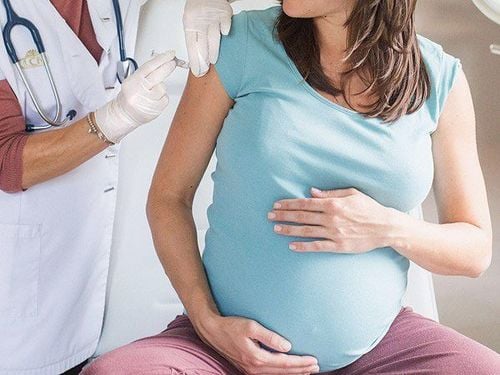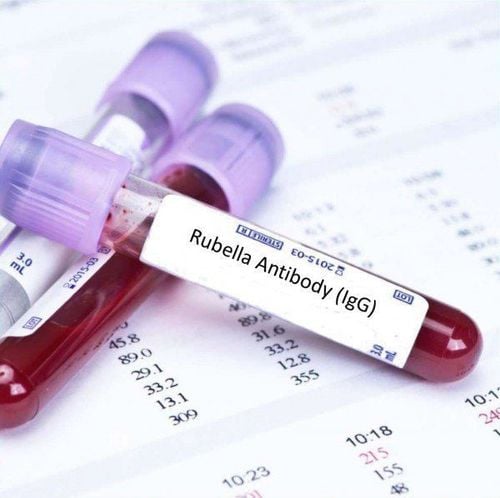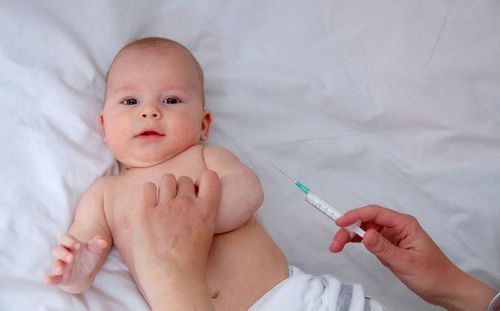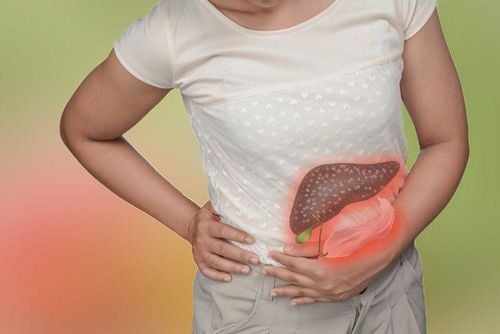This is an automatically translated article.
Tests commonly used to diagnose Rubella are IgG or IgM serological tests. This test aims to check if the patient's body has Rubella antibodies to give advice on the appropriate vaccination.
1. What is Rubella?
Rubella (also known as German measles) is a disease caused by the Rubella virus, transmitted through the respiratory tract. The disease starts with a red rash on the face, then spreads to the body. After about 3-5 days, the rash disappears on its own. Besides, patients also have typical symptoms such as: Headache, stuffy nose, runny nose, neuritis, low-grade fever, red eyes, eye inflammation, swollen lymph nodes in the neck and ears, joint pain. ,...
Rubella virus is especially dangerous for pregnant women in the first 3 months of pregnancy, easily leading to some birth defects in the baby's eyes, brain, heart, causing congenital deafness, even causing birth defects. stillbirth, miscarriage, premature birth, or congenital rubella. This disease increases the risk of death in children.

Virus Rubella đặc biệt nguy hiểm đối với phụ nữ mang thai trong 3 tháng đầu của thai kỳ
2. Rubella test and Rubella antibody overview
2.1 Rubella Tests The diagnosis of Rubella is mainly based on tests including: IgM antibody test, IgG antibody test and RT-PCR technique and cell culture. The test is done to check if the patient's body has antibodies to the Rubella virus.
When the test is positive for Rubella virus , it will produce the following 2 types of antibodies:
IgM antibody: Appears about 5-7 days after symptoms of Rubella, persists for a few days the week; Rubella IgG antibodies: Appears after a few days of IgM antibodies, persists in the body for the rest of life to help the body have long-term immunity. Rubella testing should be performed in pregnant women who have never had the rubella vaccine or who have not had rubella before. This test is usually done in the 7 - 10 week pregnancy period, with the aim of determining when pregnant women are infected and diagnosing fetal status.
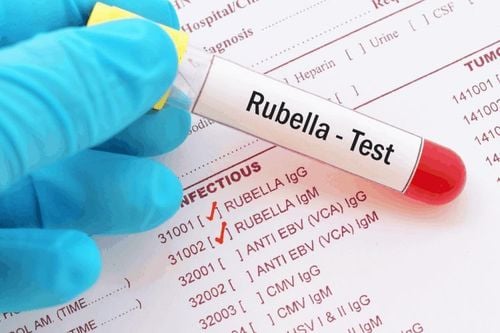
Virus Rubella đặc biệt nguy hiểm đối với phụ nữ mang thai trong 3 tháng đầu của thai kỳ
2.2 How to read Rubella antibody test in pregnant women IgM negative, IgG negative: A pregnant woman may have never had Rubella infection or been infected with Rubella but during the incubation period. At this point, IgM and IgG antibodies have not yet been produced. To obtain more accurate results, pregnant women need to consider the clinical symptoms, perform another test after about 3-4 weeks; Negative IgM, positive IgG: Pregnant women who have been infected with Rubella virus at least 10 weeks before the test, have IgG antibodies to protect the body from the risk of Rubella in the near future; Positive IgM, negative IgG: Pregnant women with new Rubella infection, need to repeat both tests after 1 week. With a fetus under 12 weeks of age, when the IgM test is positive, the fetus has an 80% risk of transmitting Rubella from the mother, having a high chance of having congenital Rubella syndrome; IgM positive, IgG positive: This is a rare condition that reflects nonspecific IgM or a false positive pregnant woman with Rubella. The test should be repeated 1 week later. If the results show that IgG is positive, IgM is negative, then the pregnant woman has new Rubella infection during pregnancy. If positive IgM remains low, positive IgG does not double, there is no cause for concern.
2.3 Is it okay to have Rubella antibodies during pregnancy? As analyzed above test results, if there is Rubella antibody, it means that the pregnant woman is or has ever had Rubella virus in her body (either by self-infection or by vaccination). Depending on the IgM and IgG results (positive or negative, high or low, time of testing), the doctor will give appropriate advice for each case.
With vaccinated cases, negative IgM antibodies and positive IgG, elevated, pregnant women do not need to worry because IgG only means to protect the body from the risk of future Rubella infection. In case of positive IgM, negative or positive IgG, the doctor will order to perform more necessary tests to have the most accurate assessment.

Tiêm phòng là cách tạo kháng thể rubella chủ động
3. When should the Rubella vaccine be given?
Currently, Vinmec International General Hospital provides Rubella vaccination service for all customers who need vaccination. Customers who choose to get vaccinated at Vinmec are committed to:
Pre-injection screening with a vaccine specialist to ensure the best health when vaccinated; Having a team of experienced and professional medical doctors and nurses; 100% of customers after vaccination are monitored for health for 30 minutes and reassessed before leaving; The post-vaccination monitoring room is equipped with modern emergency facilities, the team of doctors promptly reacts and handles the correct regimen if there is an incident of anaphylaxis, respiratory failure - circulatory arrest occurs; Vaccination room is cool, clean, creating a comfortable psychology for customers; Vaccines are imported and preserved in a modern cold storage system, cold chain cold storage meets GSP standards, keeping vaccines in the best conditions.
Please dial HOTLINE for more information or register for an appointment HERE. Download MyVinmec app to make appointments faster and to manage your bookings easily.
SEE MORE
Why vaccination, measles, mumps, rubella need to be vaccinated before pregnancy? Vaccines given before pregnancy Tips to mothers about vaccinations to protect children for life






